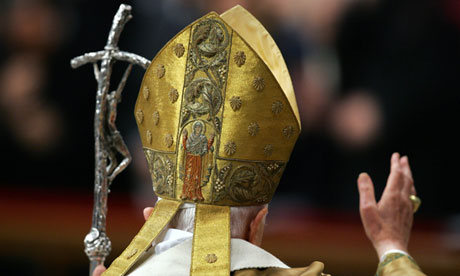As John Paul II's right-hand man, he watched a papacy fall into decrepitude. Benedict may have had no wish to follow suit.

Pope Benedict XVI is to step down at the end of this month. Photograph: Andreas Solaro/AFP/Getty Images
During the decrepitude of John Paul II, Pope Benedict, as Cardinal Ratzinger, was his right-hand man. It may be that his experience then planted in him a wish to leave office while he was still able to discharge his duties. Modern medicine does not work well with autocratic regimes traditionally renewed by death or disease, and the papacy remains the last absolute monarchy in Europe.
In Benedict's resignation statement can be seen an implied rebuke to his predecessor, who argued that clinging to life and power for as long as possible was itself a form of witness to Christ's suffering. Benedict, however, says: "I am well aware that this ministry, due to its essential spiritual nature, must be carried out not only with words and deeds, but no less with prayer and suffering. However, in today's world … both strength of mind and body are necessary, strength which in the last few months, has deteriorated in me to the extent that I have had to recognise my incapacity to adequately fulfil the ministry entrusted to me."
Nothing is known in detail of the 85-year-old pontiff's health that would force his resignation.
Benedict leaves a church battered in the west by child abuse scandals and a shortage of priests but still growing fast in the south. In the Middle East, its historic homeland, Christianity is now persecuted with almost unprecedented savagery.
In the US, Germany and Australia, there is an endless and bitter struggle within both clergy and laity between liberals and conservatives. For Benedict, western Europe had been largely lost to Christianity, and was once more a mission field which would have to be reconverted. But it's hard to see any signs of either planning or success in this task, despite the unexpected triumph of his visit to Britain in 2010. He stood on the side of reaction, and for many of his opponents epitomised it. But he did not manage to damp down the rebellions against compulsory celibacy in the priesthood, which have shaken the church in German-speaking countries. In fact, by his personal support of special arrangements for former Anglican clergy, he may have weakened the tradition of clerical celibacy.
He maintained his predecessor's hostility to capitalism, and to the sexual revolution. Neither of these things are likely to change under a new pope.
The long planning means that the succession will go as smoothly as possible but it is always difficult to predict the outcome of the conclave in which cardinals elect a pope. As the last two have not been Italian, it may be that the succession will move towards Africa and away from Europe altogether. An African would mean a greater focus on the relationships with Islam, perhaps at the expense of the relations with the rest of Christianity.
Source: The Guardian


No comments:
Post a Comment